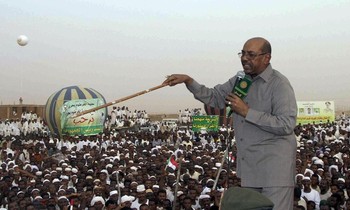Sudanese president orders government to block oil flow from South Sudan
June 8, 2013 (KHARTOUM) – The Sudanese president Omer Hassan Al-Bashir on Saturday has ordered oil minister Awad al-Jaz to block the pipeline carrying South Sudan’s crude all the way to Red Sea coastal city of Port Sudan.

“O’ Awad [oil minister] tomorrow direct oil companies to close the pipeline and after that let them [South Sudan] take it via Kenya or Djibouti or wherever they want to take it”, the Sudanese president said at a rally at the inauguration of an electricity plant in Shil’ab area.
“The oil of South Sudan will not pass through Sudan ever again,” Bashir added.
The Sudanese president said the decision was taken after thorough study to examine its advantages and drawbacks.
He revealed that Khartoum previously gave Juba a two weeks ultimatum to suspend its support to SRF whom he described as “traitors” and “mercenaries” after which Sudan made this move.
Sudanese foreign minister Ali Karti was in Juba last month where he asked Juba to allow the army to pursue rebel groups inside the South Sudanese territory and to close business offices allegedly supporting rebels, president Kiir disclosed in two different speeches.
Last April, SRF launched attacks on several towns, briefly occupying the major town of Um Rawaba in North Kordofan state. They also took control of Abu-Kershola in South Kordofan for one month.
The rebels who control areas in Blue Nile state and South Kordofan also vowed to carry out further attacks in order to topple down the regime.
Bashir pledged never to allow South Sudan to use oil revenues to buy SRF rebels weapons and equipments used in fighting the Sudanese army.
“We gave the South a full cream state with services and money but they decided to bite the hand extended to them,” he said.
He also called on youth to join military training camps to prepare for Jihad (holy war).
He added that our message to Sudan’s enemies is that we will continue cleansing the country of traitors and mercenaries, saying “they know us, even their masters who support them knew us as well from previous experiences, we are very hard to be eaten or swallowed”.
After the Sudanese army reasserted control over Abu-Kershola in South Kordofan in late May, Bashir announced that they will no longer negotiate with SRF and warned Juba that they will shut down the northbound oil pipelines if they do not cease backing the insurgents.
If Sudan goes ahead with shutting the pipeline, it will be considered a heavy blow to agreements brokered by African Union mediation team.
In September of last year, both Sudan and South Sudan signed a series of cooperation agreements, which covered oil, citizenship rights, security issues, banking, border trade among others.
Last March, the two countries signed an implementation matrix for these cooperation agreements.
The most notable provision in the agreement is related to resumption of oil exports by landlocked South Sudan which were suspended more than a year ago because of a dispute over transit fees. Oil started flowing again in April.
Both countries fell under economic duress during the stoppage. Ninety eight percent of South Sudan’s revenues come from oil. Sudan’s economy was also hit hard.
South Sudan said it had not been informed about the decision.
“We haven’t heard anything about that yet. We had agreed that the oil would flow,” Barnaba Marial Benjamin told Reuters, adding that South Sudan rejected Bashir’s claims that it was supporting rebels operating on Sudanese soil.
‘TWO DAYS’
In a separate event, Bashir’s second vice president Al-Haj Adam Youssef warned that Sudan will cancel all cooperation agreements signed with Juba unless South Sudan president Salva Kiir takes right decision to halt rebel support.
Youssef, who was addressing a graduation ceremony of popular defense female conscripts in the South Kordofan capital city of Kadugli, said that Sudan is capable of running its economy without the revenues of South Sudan oil.
The vice president renewed calls for the rebel armed groups in Darfur as well as the Sudan People’s Liberation Movement/North (SPLM-N) to engage in negotiations with the government, saying that armed struggle wouldn’t solve Sudan’s problems.
He added that the government will not allow presence of Darfur rebels in South Kordofan state, noting that the government is resolved to cleanse all towns and villages in the state from rebellion.
Yousif also announced that the government would negotiate with the SPLM-N only on the basis of the protocols related to Blue Nile and South Kordofan in the 2005 Comprehensive Peace Agreement (CPA) and with the Darfur rebels on the basis of Doha Document for Peace in Darfur (DDPD).
Last April, the first round of talks since 2011 between the SPLM-N and the Sudanese government in the Ethiopian capital Addis Ababa have adjourned without success in bridging the wide gap between the two sides.
OIL MEETING CANCELLED
In a related issue, the pro-government al-Sudani newspaper said that Khartoum’s delegation planned trip to Addis Ababa to participate in oil committee meeting has been cancelled.
The report said that the newly-appointed Nigerian head of the committee called for this meeting to take place on Sunday.
South Sudan’s delegation headed by Pagan Amum are supposed to have already arrived to the meeting venue.
(ST)
